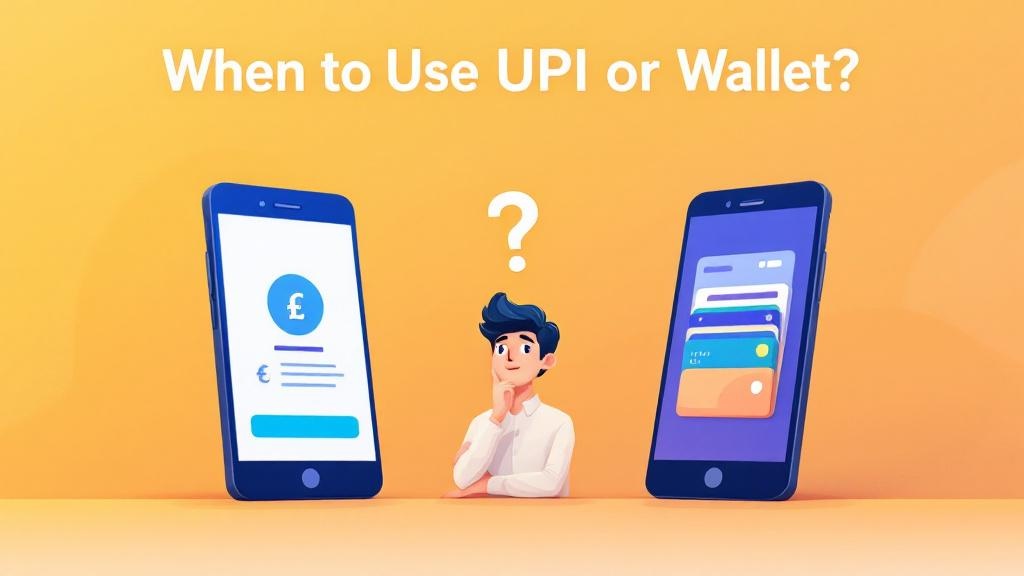In today’s fast-paced world, digital payments have revolutionized how we transact, making everyday purchases more convenient and efficient. With various options available, two of the most popular methods for digital transactions in India are Unified Payments Interface (UPI) and digital wallets. Both serve the purpose of enabling easy, instant payments, but they differ significantly in their use cases, benefits, and functionality.
So, when should you use UPI over a digital wallet? Or vice versa? In this blog post, we’ll explore the best use cases for both, compare UPI vs. wallet, and help you make the right choice based on your specific needs. Whether you’re making quick bill payments, online shopping, or peer-to-peer transfers, we’ll cover it all.
UPI vs Digital Wallet: What’s the Difference?
Before diving into the use cases, let’s quickly understand the difference between UPI and digital wallets.
What is UPI?
UPI, or Unified Payments Interface, is a real-time payment system that enables money transfers between banks via mobile apps. It’s an instant, secure, and interoperable platform designed by the National Payments Corporation of India (NPCI). With UPI, you can transfer money between different banks without needing the recipient’s account number—just their UPI ID or QR code.
Key Features of UPI:
-
Instant money transfers.
-
Works across banks (interbank transactions).
-
No need for physical cards.
-
Secure with two-factor authentication.
What is a Digital Wallet?
A digital wallet (or e-wallet) is a mobile application or platform that allows you to store digital currency and make payments via the internet. These wallets can hold both virtual and physical money, including debit/credit card details and loyalty cards. Popular digital wallets in India include Paytm, PhonePe, Google Pay, and Amazon Pay.
Key Features of Digital Wallets:
-
Store money for future transactions.
-
Offers rewards and cashback.
-
Can link to credit/debit cards for added convenience.
-
Some wallets support peer-to-peer transfers.
Now that we’ve established the basics, let’s look at the best use cases for UPI and digital wallets.
Best Use Cases for UPI Payments
UPI is known for its seamless integration with banking systems, making it a go-to solution for several payment scenarios.
1. Peer-to-Peer Transactions
When you need to send money to friends or family instantly, UPI is often the best choice. Whether you’re splitting a restaurant bill or paying someone back for a gift, UPI transfers are quick, easy, and secure.
When to choose UPI over wallet:
-
No need for an intermediary (like a wallet).
-
Transfers are directly linked to your bank account.
-
No added fees for P2P transactions.
2. Bill Payments and Recharges
UPI is a great tool for paying utility bills, recharging your phone, or adding money to your DTH account. Many apps like Google Pay, PhonePe, and BHIM allow UPI-powered bill payments with just a few taps.
When to use UPI payments for bill settlements:
-
You need to pay utility bills or prepaid recharges (e.g., mobile, broadband).
-
UPI offers real-time transaction updates.
-
You prefer bank-to-bank payments without relying on a third-party wallet.
3. In-Store Payments via QR Code
UPI’s ability to scan QR codes and pay instantly makes it the perfect option for in-store purchases. Whether you’re at a local shop, grocery store, or restaurant, UPI’s QR code payment system is widely accepted and fast.
When to use UPI for in-store payments:
-
You want to avoid physical cards or cash.
-
You’re in a store that offers UPI payments through QR codes.
-
You prefer secure and instant transactions.
Best Use Cases for Digital Wallets
Digital wallets offer more than just payment options—they are also useful for managing multiple payment methods and enjoying benefits like discounts and loyalty points.
1. Online Shopping
When shopping online, digital wallets like Paytm, Google Pay, and Amazon Pay often make the checkout process smoother. These wallets store your payment details securely and allow for faster payments, especially on e-commerce websites.
Wallet vs. UPI for online shopping:
-
Wallets store payment methods (cards, bank accounts) for quicker checkouts.
-
You may earn cashback and rewards when using certain wallets.
-
UPI payments are also supported, but wallets provide more incentives and ease.
2. Storing Money for Future Use
Unlike UPI, digital wallets allow you to pre-load funds, which means you can set aside money for specific purposes. This is ideal for managing budgets or saving for a particular event or expense.
When to use a wallet over UPI for storing funds:
-
You prefer storing a certain amount of money for future use.
-
You enjoy the rewards, cashback, or discounts offered by digital wallets.
-
You want to avoid using your bank account directly for small transactions.
3. International Payments
Some digital wallets offer international payment capabilities, enabling users to make cross-border transactions using foreign currency. Digital wallets like PayPal and Google Pay allow users to send money to other countries or pay in foreign currencies.
When to choose a digital wallet over UPI:
-
You need to send or receive international payments.
-
You need to store and manage funds in multiple currencies.
-
You’re looking for an easy way to shop from international websites.
Key Differences Between UPI and Digital Wallets
Understanding the differences between UPI and digital wallets is essential to making informed decisions about which to use in various scenarios.
| Feature | UPI | Digital Wallet |
|---|---|---|
| Transaction Speed | Instant | Instant or delayed (depends on the wallet) |
| Usage | Primarily for bank-to-bank transfers | Storing funds and making payments |
| Fees | Free for most transactions | Transaction fees (in some cases) |
| Security | High security with bank-grade encryption | Varies by wallet, generally secure |
| Accessibility | UPI ID or mobile number required | App-based login with wallet credentials |
| Rewards and Offers | Limited to specific apps | Frequent cashback, discounts, and rewards |
FAQs on UPI vs Digital Wallets
1. What is better for peer-to-peer transfers, UPI or wallet?
UPI is ideal for P2P transfers as it directly links to your bank account and is instant. Wallets can also be used for P2P transfers but may involve extra steps.
2. Which is more secure for online payments, UPI or wallet?
Both are secure, but UPI transactions are protected by bank-level security. Wallets may offer additional security features like PIN codes or biometric authentication.
3. Can I use UPI for international transactions?
UPI is primarily for domestic transactions. If you need to make international payments, digital wallets like PayPal or Google Pay offer more flexibility.
4. Should I use UPI or wallet for bill payments?
UPI is more convenient for bill payments since it is directly linked to your bank account. However, wallets may offer discounts or cashback for bill payments.
5. Is there a limit to UPI payments?
Yes, UPI transactions have a limit, typically around ₹1 lakh per transaction. This limit can vary depending on the bank and type of transaction.
Conclusion: When to Use UPI vs Wallet
Ultimately, the decision between UPI and digital wallets depends on your specific needs. UPI is great for seamless bank-to-bank transfers, bill payments, and QR code transactions, while digital wallets excel in storing funds, online shopping, and offering rewards.
By understanding their unique benefits and use cases, you can make smarter payment choices that align with your lifestyle and preferences. Whether you’re paying a friend back or shopping online, the right payment method can make all the difference in ensuring a fast, secure, and convenient transaction experience.








Comments (0)